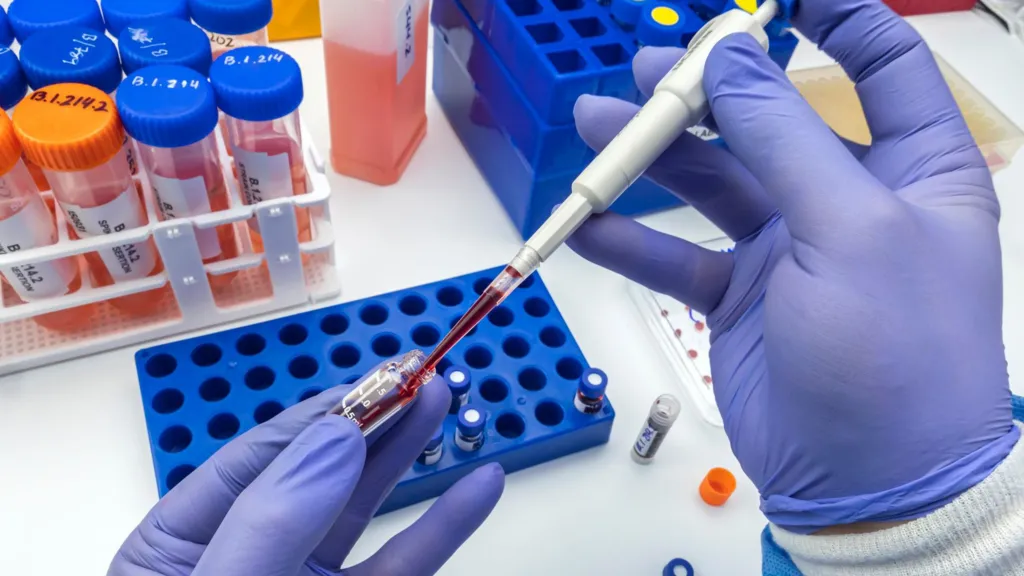An NHS provider that won a £2bn contract to deliver blood-testing services for hospitals and GPs is failing to deliver reliable results, according to medical professionals.
Synnovis, a public-private partnership between the medical company Synlab and Guy's and St Thomas' and King's College hospital foundation trusts, secured the contract in 2021 to deliver pathology services for just under 200 GP surgeries across south-east London.
The BBC has spoken to GPs who say incorrect and delayed blood results are a "regular concern" and that the firm's performance is causing great distress to patients.
Synnovis said it was "incredibly sorry for the inconvenience and upset caused to those affected".
'National scandal'
The company, which fell victim to a ransomware cyberattack in June 2024 that caused more than 1,000 NHS operations to be postponed, said the attack had "significantly reduced our capacity to process samples". Synnovis, which serves six hospitals in London, added that it had "dedicated every available resource to delivering clinically safe and largely manual interim solutions".
According to more than a dozen GPs we heard from, across all of south-east London's boroughs, the severity of challenges they face under Synnovis is causing anxiety for both patients and doctors.
The GPs told the BBC that the blood-test issues were leading to unnecessary hospital referrals and wasted patient appointments. In one case the BBC was told about, an elderly man who was caring for his wife with dementia needlessly spent hours in accident and emergency (A&E) due to problems with his test.
One GP, who spoke to the BBC anonymously, said: "It would [previously] never cross our minds that a blood test might not be reliable. This is now an everyday concern.
"The current problems with Synnovis is nothing short of a national scandal," they added.
Kemi, a 17-year-old college student, started to experience heart palpitations, breathlessness and fatigue six months ago.
Unable to attend college because of her health issues, in November she sought an appointment at her GP surgery, which relies on Synnovis for blood testing.
When the results came back, she was told there was a problem. "I found out there was something wrong with the blood test – my potassium was too high, which is not normal," she said.
However, Kemi said her GP told her that her potassium levels were not actually high, but that this result was found because her blood sample had coagulated as it had waited too long to be processed.
When she received her results on the NHS app – which the BBC has seen – it said they were "invalid due to laboratory error". Kemi said the situation had left her "frustrated, sad and confused".
"I'm really stuck. I'm depressed, I'm anxious that something's going to happen to me before I get a diagnosis," she told us. "I am worried that I am going to end up seriously hurt because I can't get the diagnosis I need."
GPs have told the BBC that unreliable blood results, with erroneously high levels of potassium caused by processing delays, are a regular occurrence since Synnovis began the service.
High potassium levels in the blood can point to serious health issues, such as heart problems.
Because of this, GPs say they cannot ignore blood-test results that indicate high potassium – even if they believe them to be incorrect – and they are obliged to refer patients immediately to A&E.
GPs say these patients are often turned away after being retested at hospital, where normal potassium levels are discovered.
'I couldn't reassure them'
It is an issue Dr Shah – not his real name – says he experiences on a weekly basis.
"If the potassium level is above six it can cause problems with the heart and heart rhythm disturbances that could potentially prove to be fatal," Dr Shah said. "It's an urgent thing that needs to have the sample repeated and to make sure the result is genuine or a false reading."
Dr Shah, who has been a GP for nearly three decades, said the frequency of elevated potassium in blood results had been unusually high at his surgery in recent years.
"It turned out that there were delays in the collection of samples from the GP surgeries, then to the labs… delays in processing in the labs, which was causing the results to be high," he said.
Dr Shah told the BBC he recently had to send a man in his 80s to hospital as his potassium level appeared elevated on a Synnovis blood test. He explained that the patient had come to the surgery with his wife who had dementia and his daughter, and the family were concerned about long waiting times at A&E that evening.
"I had to say to them they shouldn't leave it until the next day because whilst I thought it was normal, I couldn't reassure them," Dr Shah explained. At hospital, the patient's potassium level was eventually found to be normal and he was discharged.
